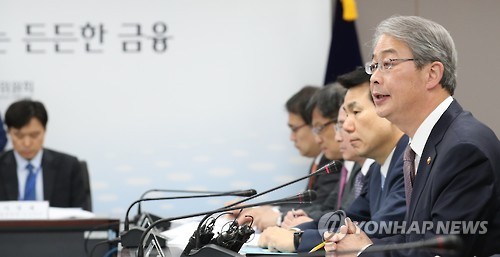South Korea's financial authorities on Monday announced a shift to an emergency operation mode to cope with a host of challenges facing Asia's fourth-largest economy.
Yim Jong-yong, tapped as the nation's finance minister, described the current situations as a crisis that's like "stepping on thin ice."

Yim, chairman of the Financial Services Commission (FSC), was presiding over an emergency meeting with other top officials on finance and civilian leaders in the local market.
It came amid growing worries about the implementation of government policies, with the Park Geun-hye administration gripped by a political crisis over a massive influence-peddling scandal that involves Park's longtime friend Choi Soon-sil.
Among external uncertainties is the outcome of the US presidential election slated for Tuesday (local time).
The FSC launched a joint "emergency situation room" together with the Financial Supervisory Service (FSS).
"(We) will closely monitor all financial market situations at home and abroad around the clock, strengthening cooperation with the finance ministry, the Bank of Korea and other related organizations," Yim said.
If necessary, the government will take measures to stabilize the market without hesitance in accordance with existing contingency plans, he added.
Yim cited various "risk factors," such as the US move to raise interest rates, Brexit and European banks' troubles in addition to sluggish export growth, lackluster employment market and huge household debts.
"Both internal and external risks are weighing heavily on our economy. It may get into bigger difficulties, given the recent circumstances," Yim warned. "Even a small crack in the management of the risks will lead to considerable impact to the economy and the entire financial system."
Concerns have grown in recent weeks over potential instability of the nation's financial market.
The benchmark stock price index KOSPI dropped to 1,982 last Friday from 2,044 in late September. The local currency also weakened to 1,143 won against the US dollar from 1,101 won.
Yim said the government will keep tabs on any possible unusual trends connected with foreign exchange borrowing conditions and exposure to external risks.
"(We) will step up efforts for the stabilization of the foreign exchange market," he said.
Participants in the meeting included FSS Gov. Zhin Woong-Seob; Korea Exchange CEO Jeong Chan-woo; Ha Young-koo, chairman of the Korea Federation of Banks; Hwang Young-key, head of the Korea Financial Investment Association; and Lee Soo-chan, leader of the Korea Life Insurance Association. (Yonhap)







![[Today’s K-pop] Blackpink’s Jennie, Lisa invited to Coachella as solo acts](http://res.heraldm.com/phpwas/restmb_idxmake.php?idx=644&simg=/content/image/2024/11/21/20241121050099_0.jpg)